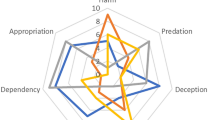Abstract
Our economic system, the market economy, is a part of a broader system or “society.” We frequently study the operation of the market economy as if it were autonomous, even though there are many complex and mutual relationships between society, the economic system and the other systems – political, cultural, religious, legal, etc. – that form part of society. In a market economy we may identify several components: a frame or background in which the economic activity takes place, a set of ideas and theories, the values shared by this society, the set of institutions, norms and rules that control the economic behavior of people, and the incentives or motivations of the economic agents. The play of these elements defines the operation of a market economy. Is ethics an institution, or does it belong to the set of values and ideas? In this paper I will discuss the role of institutions, norms and rules in society, with special reference to the economic system, in order to gain insight into the relationship between institutions and ethics. I study first the concept and features of social institutions and norms; second, institutional change, and third, the relationship between ethics and institutions.
Similar content being viewed by others
References
Alchian, A. A.: 1950, ‘Uncertainty, Evolution and Economic Theory’, Journal of Political Economy, 58.
Argandoña, A.: 1989, ‘Relaciones entre economa y ética’, IESE Research Paper, Barcelona, No. 166.
Argandoña, A.: 1996, ‘Economic Ethics and Institutional Change’, IESE Research Paper Barcelona, No. 302.
Argandoña, A.: 2002, ‘The Social Dimensions of Labour Market Institutions’, in A. Argandoña and J. Gual (eds.), The Social Dimension of Employment. Institutional Reforms in Labour Markets (Edward Elgar, Cheltenham).
Chandler, A. D.: 1977, The Visible Hand (Harvard University Press, Cambridge, MA).
De Alessi, L.: 1988, ‘How markets alleviate scarcity’, in V. Ostrom, D. Feeny and H. Picht (eds.), Rethinking Institutional Analysis and Development (International Center for Economic Growth, San Francisco, CA).
Eggertsson, T.: 1990, Economic Behavior and Institutions (Cambridge University Press, Cambridge).
Elster, J.: 1989, ‘Social norms and economic theory’, Journal of Economic Perspectives, 34.
Hayek, F. A.: 1960, The Constitution of Liberty (Routledge and Kegan Paul, London).
Hayek, F. A.: 1988, The Fatal Conceit. The Errors of Socialism (Routledge and Kegan Paul, London).
Hechter, M.: 1993, ‘Values Research in the Social and Behavioral Sciences’, in M. Hechter, L. Nadel and R. E. Michod (eds.), The Origin of Values (Aldine de Gruyter, New York, NY).
Heckatorn, D. D. and S. M. Maser: 1987, ‘Bargaining and Constitutional Contracts’, American Journal of Political Science, 31.
Knight, J.: 1992, Institutions and Social Conflict (Cambridge University Press, Cambridge).
Langlois, R. N.: 1986, ‘Rationality, Institutions, and Explanation’, in R. N. Langlois (ed.), Economics as a Process. Essays in the New Institutional Economics (Cambridge University Press, Cambridge).
Lewis, D.: 1969, Convention (Harvard University Press, Cambridge MA).
Mansbridge, J.: 1998, ‘Starting with Nothing: On the Impossibility of Grounding Norms Solely on Selfinterest’, in A. Ben-Ner and L. Putterman (eds.), Economics, Values, and Organizations (Cambridge University Press, Cambridge).
Nelson, R. N.: 1995, ‘Recent Evolutionary Theorizing about Economic Change’, Journal of Economic Literature, 33.
North, D. C.: 1981, Structure and Change in Economic History (Norton, New York, NY).
North, D. C.: 1990, Institutions, Institutional Change, and Economic Performance (Cambridge University Press, Cambridge).
Nozick, R.: 1974, Anarchy, State, and Utopia (Basil Blackwell, Oxford).
Schelling, T.: 1960, The Strategy of Conflict (Harvard University Press, Cambridge MA).
Schotter, A.: 1981, The Economic Theory of Social Institutions (Cambridge University Press, Cambridge).
Schotter, A.: 1989, ‘Comment’, in T. Shiraishi and S. Tsuru (eds.), Economic Institutions in a Dynamic Society: Search for a New Frontier (Macmillan, London).
Shepsle, K. and P. Ordeshook: 1982, Political Equilibrium (Kluwer-Nijhoff, Boston, MA).
Sugden, R.: 1986, The Economics of Rights, Cooperation and Welfare (Basil Blackwell, Oxford).
Sugden, R.: 1989, ‘Spontaneous Order’, Journal of Economic Perspectives, 3.
Ullman-Margalit, E.: 1978, ‘Invisible-hand Explanations’, Synthese, 39.
Williamson, O. E.: 1975, Markets and Hierarchies (Free Press, New York, NY).
Rights and permissions
About this article
Cite this article
Argandoña, A. Economic Ethics and Institutional Change. Journal of Business Ethics 53, 191–201 (2004). https://doi.org/10.1023/B:BUSI.0000039408.30285.6d
Issue Date:
DOI: https://doi.org/10.1023/B:BUSI.0000039408.30285.6d




